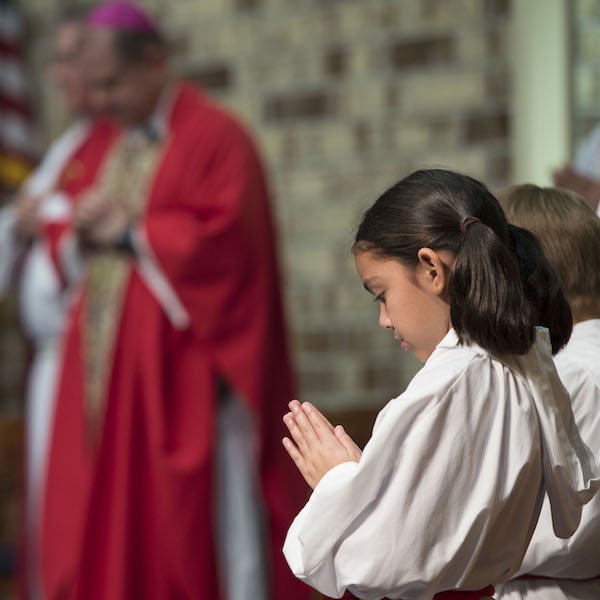Talking to Kids about Religion
U.S. Air Force photo by Andrea Jenkins
My husband and I are both agnostic when it comes to religion. We were both raised Catholic; we both lean atheist; but we both believe strongly that we simply don’t—and can’t—know enough to be able to say anything definitively about whether there is a god(dess) or god(desse)s. And we’re both the kind of people who spend a lot of time thinking about that. (I think the moment when I really knew he was the one is when we realized that we had both stayed up late at night as kids worrying over the idea of eternity. Clearly I'm a romantic.)
Matthew has an MA and part of a PhD in Philosophy, and I have an MA and part of a PhD in Religious Studies, so this question is also something we’re both well equipped to think about. It was never our intention to raise our children in a particular religious tradition, nor did we plan to keep them away from religion altogether. Religion is an important part of our cultural history, and Matthew argued that it’s important for children to hear the stories of religion to understand the world around them. I didn’t disagree.
I’ve always felt it was important that people come to their religious beliefs on their own, and that’s something I especially feel is important for my own children. I don't want to force agnosticism or atheism on them any more than I want to force a specific religious tradition on them. I want to give them the tools to understand the world around them, and I want to expose them to as many different ways of thinking and believing that I can. I will support them in whatever they choose to believe, but I will not support intolerance or cruelty related to those beliefs,
Thinking about raising children in the abstract is always very different than dealing with the children you have, and this is certainly true with religion. When the kids were very little religion just didn't come up very much for us. They went to church occasionally with Grammy, and it was no big deal. They heard about God and Jesus, but very little kids often can't really distinguish real from unreal in a meaningful way. So they didn't question whether God was real any more than they questioned whether Superman was real. God was a figure they'd heard of just as Superman was. I don't say that to be glib, but rather because I think there are important parallels. Until a child starts to question whether a flying creature with x-ray vision and super strength is real, it's unlikely he or she is going to question any story about God.
But my children are older now, and it’s getting more complicated. For a variety of reasons we’ve chosen to send out kids to a Catholic school. The school is definitely the right fit for our family, but the kids are obviously learning religion there, which has led to a lot of questions at home. The kids often want to say prayer before meals at home as they do in school, which is fine with us. Arthur, who is 3, loves being the one to lead the prayers. He tends to conflate a couple of prayers into one, and he employs a huge sweeping hand gesture that is always endangering his milk cup, but the sentiment is sweet, and he's very proud of himself.
Teddy is 6, and a philosopher, and his relationship with religion is much deeper. Upon finding a penny on the ground, he noted that it was a sign that God was real, but he resisted praying for something he wanted because he was frustrated that God had not granted his prayer for one of the boys in his class to leave him alone.
One night recently as Matthew was cooking dinner, Teddy asked him if heaven and hell were real. Matthew didn’t try to shy away from the question or deflect. He said that he didn’t have enough information to know, but that he had questions about whether they could be real, and he shared some of the questions. Teddy is himself a deep thinker, and he took it all in seriously. Knowing Teddy, he will probably come back in a week or a month with follow-up questions he's been ruminating on since then. I hope he's not staying up all night thinking about eternity, but it wouldn't surprise me if he did. I took the opportunity to talk to Teddy about the concept of agnosticism, that there are things we just don't know. I think part of the basis of learning to critically examine the world around you is to realize that sometimes it's not about having all of the answers but rather learning to ask the questions.
Matthew and I certainly don’t have all the answers (maybe we should have finished those PhDs). Our kids are still pretty little, and I'm sure they will have more difficult questions for us as they get older. But we are committed to staying on the path of providing them with the information we do have or can help them find, engaging them in conversation and questioning, and allowing them to make their own decisions about what or whether to believe.



